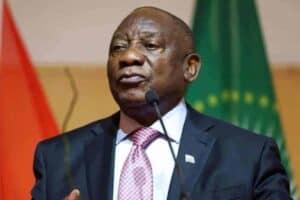An average MP earns around R1.1 million per annum, including a number of other perks, but this apparently isn't enough.

While the average South African salary is just above R10,000 per month and minimum wage hovers around R3,500, the country’s members of Parliament (MPs) are apparently struggling to make ends meet with their average monthly salary of R95,000.
Speaking to the media on Thursday, President Cyril Ramaphosa said MPs were struggling to “make ends meet” despite them seemingly “living it up”, saying they usually have two houses since they also have to live in Cape Town to attend Parliament.
“The work we take on or impose on them as MPs is quite costly, many of them don’t end up making ends meet.”
“It may seem to many people that they are living it up and they have a very good life; believe you me, it is not,” said the President.
ALSO READ: ‘MPs struggle to make ends meet’: Ramaphosa pleads backbenchers’ case
Ordinary members of the National Assembly earn an average of R1.1 million per annum. According to the gazetted salaries for top officials for the 2021 financial year, the president, deputy president, speaker of Parliament and the chairperson of the National Council of Provinces (NCOP) were each entitled to a package of R2.8 million per year.
Most of SA living on less than R12,000 a month
Members of Parliament, like many government officials, did not, however, feel the brunt of job and salary cuts during the pandemic and hard lockdown, said labour lawyer advocate Alexia Vosloo-DeWitt.
While the minimum wage is R3,500, the average South African earns approximately R10,000 per month, she said.
“Someone who earns R3,500 and lives by themselves has to pay rent, food and spend on transport. On R3,500, I hardly think it’s possible. We know the majority of South Africans are struggling to survive and most of our youths are unemployed.”
“But when looking at different sectors which have different pay scales, I would say the average South African earns more than R10,000,” she said.
According to the BankservAfrica Takehome Pay Index (BTPI), the average salary in April 2021 was just over R12,000, despite the typical take-home pay increasing by 2.2% after inflation.
“After inflation, the average take home pay was R12,958 in April 2021. The average salary, in nomal terms, increased by 68% year-on-year to reach R15,083,” said BankserveAfrica’s head of stakeholder engagements, Shergeran Naidoo.
But despite the country’s financial struggles and the massive income gap, Ramaphosa has signed off on a 2.8% increase for ordinary MPs while Cabinet ministers who earn more than R1.5 million a year received a 0% salary increase last year.
This, Vosloo-DeWitt said, was extremely unfair.
Tighten your belts
“Its like comparing apples with pears. It is really sad there is this reference that [MPs] are struggling to make ends meet. Maybe they should tighten their belt and let go of luxuries. Why should they have a home close to Parliament? We are spending billions a year on travel for our officials. It would cost them less if they have to pay their own travel.
“There is big privilege. [MPs] have two homes but we have so many people living in informal settlements and can’t afford a home,” she said.
Time to take care of our poor
The solution to the country’s woes could be all sectors implementing a salary freeze for those at the top of the wage gap and help those at the “bottom”, such as domestic workers and farm workers who earn “poverty wages” to get a leg up, said labour lawyer advocate Dunstan Farrel.
ALSO READ: NA approves 0% salary increment for public office bearers
“The bottom of the pile is hurting more than us. Their biggest cost is petrol. It is not fair to say MPs are struggling to make ends meet when they live lavish lifestyles. I think we should take a salary freeze from parliamentarians to civil servants. Generally, people are well-paid except for domestic workers and farm workers who earn poverty wages,” Farrel said.
The perks that come with being an MP
The latest Ministerial Handbook of 2019 published a revised guide on members of the executive.
- VIP drivers and protection by the South African Police Service (Saps). National members also receive one vehicle for official use in each seat of office, which may also be used by their spouse and other dependents. Should an official use their own private vehicle, they will be reimbursed.
- Members and their spouses may travel for official purposes at the expense of the relevant department and must travel in business class using the cheapest of three prices.
- Members may occupy a state-owned home free of charge while the state will contribute up to R250,000 in security upgrades.






